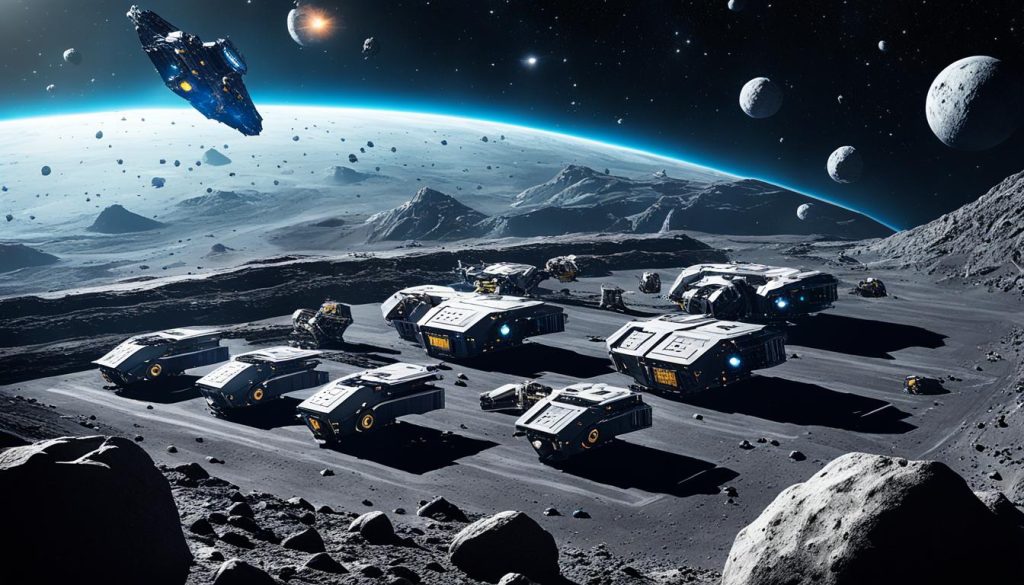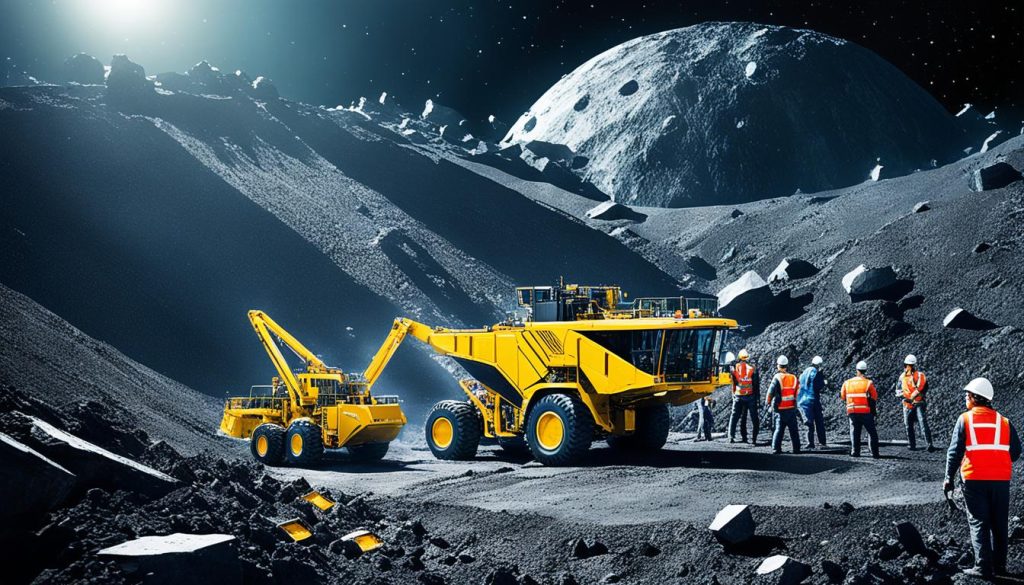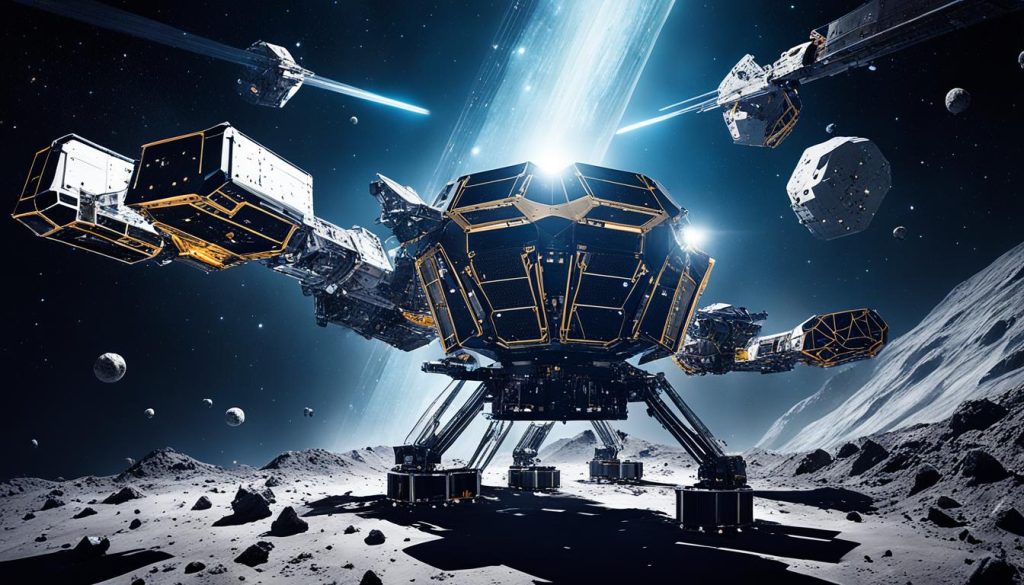Scientists are looking for new ways to get resources because of environmental damage and the use up of natural resources. Asteroid mining is seen as a possible answer1. In 2012, companies like Planetary Resources and Deep Space Industries started working on asteroid mining. They aim to find valuable things like gold, platinum, cobalt, and palladium in space1.
This could be very profitable and might even create a new economy in space. But, it could also change the global market for raw materials. This could be bad news for countries that depend a lot on mining for their economy1.
Key Takeaways
- Asteroids contain an estimated $1.5 trillion worth of natural resources, equivalent to the current annual global mining industry.
- The total value of minerals within the asteroid belt could be as high as $700 quintillion.
- Established space-faring nations are likely to control the asteroid mining market, leaving other countries struggling to keep up.
- Asteroid mining could disrupt the global raw materials market and pose risks for developing economies heavily reliant on mineral exports.
- Technological advancements and decreasing launch costs are making asteroid mining more feasible as a solution to dwindling terrestrial resources.
The Potential of Asteroid Mining
Opportunities and Resources
Asteroid mining could unlock valuable resources, changing many industries. NASA’s budget shows it’s a growing field, making up about 1% to 0.4% of the federal budget since the 1970s2. It could give us rare earth elements and precious metals for clean energy and other important uses3.
The Asterank database says the top 10 asteroids to mine could bring in about $1.5 trillion in resources2. One asteroid, 16 Psyche, might have $700 quintillion worth of gold, enough for every person on Earth to get about $93 billion2. Mining asteroids could also be better for the planet by avoiding harmful mining methods2.
It could also help make solar power satellites, a clean energy source for the future2. Companies like TransAstra and Origin Space are working on technologies for asteroid mining and space industries2.
Research from the University of Nottingham in China says asteroid mining could supply Earth’s needs, supporting longer stays on the Moon and Mars4. But, it also points out the need for rules to make sure asteroid mining benefits everyone fairly4.
“The financial and technological barriers to mining asteroids are lower than the psychological barriers.”2
The space mining industry is growing, making it easier to extract wealth from asteroids. With new tech and the need for rare resources, asteroid mining could help meet global needs and reduce environmental harm3.
Technological and Economic Challenges
Asteroid mining has huge potential, but it faces big tech and economic challenges. The cost to develop the tech for asteroid mining is huge, like NASA’s OSIRIS-REx mission, which could cost over $1 billion to bring back a small piece of the asteroid Bennu5.
Companies like Planetary Resources and Deep Space Industries tried to mine asteroids but couldn’t get the funding needed. They were bought by other companies5. This shows how hard it is to make asteroid mining work financially.
Even though mining a few asteroids could make a huge profit, like $1.5 trillion5, the cost to start is still too high. For example, one asteroid, 16 Psyche, might have $700 quintillion worth of gold5, but getting to it is expensive.
The market for raw materials is about $660 billion5. If asteroid mining works, it could lower the value of gold by 50%, says a study from Tel Aviv University5. This means we need to think carefully about how mining space affects the economy.
| Key Challenges | Potential Impacts |
|---|---|
| High cost of developing asteroid mining technology | Planetary Resources and Deep Space Industries unable to secure funding and were acquired |
| Potential devaluation of precious metals like gold | Researchers at Tel Aviv University simulated a 50% devaluation of gold on Earth due to space minerals |
| Vast distances and energy consumption required for asteroid mining | Challenges in making asteroid mining economically viable |
The challenges for asteroid mining are big, but the rewards could be huge. To succeed, we need a lot of money, new ideas, and to think about how it affects the world economy6.
“Mining the top 10 most cost-effective asteroids could produce a profit of around $1.5 trillion.”
Asteroid mining is still a tempting idea, but it’s hard to make it work. Overcoming tech and money problems will decide if this new industry can grow6.
The Economics of Space Mining: Extracting Wealth from Asteroids
Asteroid mining could change the game, bringing in a lot of wealth. Neil DeGrasse Tyson thinks the first trillionaire might come from this field5. It could also boost the space economy, offering new chances in tourism and settlements. But, it might also shake up the global market, valued at about $660 billion7.
Researchers at Tel Aviv University ran a simulation. They found that one shipment of space minerals could cut gold prices in half on Earth5. This could lead to a big fight over resources, hurting the economies of countries that depend on minerals5.
| Potential Impacts of Asteroid Mining | Positive | Negative |
|---|---|---|
| Economic Opportunities | ||
| Resource Availability |
Asteroid mining is a complex topic with big economic ups and downs. It could bring in a lot of wealth and resources but also risks the global raw materials market and jobs in developing countries5. We need careful planning and policies to make sure it benefits everyone and is done safely7.
As asteroid mining grows, we must work together to create rules that help innovation, ensure access to resources, and protect everyone’s prosperity7. With the right steps, asteroid mining could help drive progress and sustainable development worldwide6.
Impact on Developing Economies
Asteroid mining could greatly change the economies of countries that rely a lot on mineral exports4. Nations like South Africa and Zimbabwe, big producers of platinum, might struggle if asteroid mining takes over4. The Democratic Republic of the Congo, a major source of cobalt, could also face big economic problems if asteroid mining makes cobalt too common4. Losing mining jobs could be very hard for people in these countries, as they might not find new jobs in asteroid mining easily4.
Potential Consequences
A study by the University of Nottingham in Ningbo, China, looked into how asteroid mining could affect the world economy4. They considered market forces, environmental effects, and the type of asteroids and minerals mined4. They also looked at the Outer Space Treaty, which aims to help all of humanity4. The study used a Unified Equity Index to see how asteroid mining could change global fairness from 2025 to 20854. It shows the risks of asteroid mining without rules and the need for smart use of resources4.
The Outer Space Treaty, signed by 112 countries, is key in space laws4. The researchers suggest adding new rules to the treaty to make sure resources are shared fairly4. They point out the need to think about how asteroid mining affects poor countries and call for a careful approach to space and resource use4.
“The psychological barrier to mining asteroids is high, the actual financial and technological barriers are far lower.”
As space technology grows, we must consider how asteroid mining could affect poor countries4. It’s important for policymakers and industry leaders to make sure space exploration and mining help everyone, not just a few4.
Potential Solutions and Regulations
As asteroid mining becomes more real, many solutions are being looked at to help developing economies. One idea is to give developing countries access to asteroid mining tech. This would let them join and gain from the space mining economy8. Another plan is to help countries that mainly rely on mining exports diversify their economies. This can be tough but is seen as a way to lessen the impact of asteroid mining8.
Some experts suggest that rich countries using asteroid mining should pay poorer countries to lessen the economic blow from this new industry8. Also, making rules for asteroid mining could help. This would make sure mining doesn’t get out of control and harm the environment8.
But, current laws about space, like the Outer Space Treaty from 1967 and the Moon Agreement from 1979, are not clear. They leave many questions about managing space resources unanswered9. In 2015, the U.S. passed the U.S. Commercial Space Launch Competitiveness Act. This law lets private people and companies own and use space resources9. However, some think this law gives miners too much freedom, which could stop everyone from having equal access to space9.
In 2020, NASA started the Artemis Accords. This is a deal between countries about peace, sustainability, and working together in space. It says countries will follow the Outer Space Treaty9. People who want more rules for space mining say we need a global agreement. They compare it to the California Gold Rush, seeing it as a chance to get rich in space mining9.
There are also calls for rules to protect economies that depend on mining. These rules would help manage the risks of asteroid mining9. Some worry about the effect on the environment. They want rules that protect nature while still allowing mining9.
Getting countries to agree on space mining rules is hard. It’s because of the complexity of international law and the lack of clear customs or court decisions. It shows we need everyone to work together to make strong rules9.
Asteroid mining could be very valuable, with resources worth trillions of dollars8. But, getting these resources out of space is hard. We need new tech for extraction, sorting, and refining. Launching spacecraft and mining is also very expensive8.
New tech like robots and drones could help with mining. Using resources from asteroids to fuel mining could also make it more possible8.
As asteroid mining grows, we need to work together on rules and sustainable practices. This will help make sure everyone can use space resources fairly and protect developing economies9. Finding the right balance between tech progress, economic gains, and protecting the environment is key to making asteroid mining good for everyone8910.
Conclusion
Asteroid mining could unlock a treasure trove of valuable resources. Some asteroids are thought to be worth trillions of dollars, showing the huge economic gains possible11. Rare earth metals, vital for today’s tech, are likely found in large amounts on asteroids, offering a new source11. This mining could also be better for the planet, reducing harm to our ecosystems11.
But, there are big hurdles to overcome, like high costs and tech challenges12. Creating the tech and infrastructure for asteroid mining is expensive and tough12. Also, it could disrupt the economies of poor countries that depend on mineral exports11.
Policymakers must create rules to make sure asteroid mining benefits everyone fairly and minimizes harm12. Working together, space-faring nations and developing economies can shape this new industry’s future12. By tackling the issues, we can make the most of asteroid mining’s potential for space exploration and Earth’s sustainable development1112.
FAQ
What are the valuable resources that can be found in asteroids?
What are the potential economic benefits of asteroid mining?
What are the major technological and economic challenges of asteroid mining?
FAQ
What are the valuable resources that can be found in asteroids?
Asteroids are full of valuable stuff like rare earth elements, gold, and platinum. They also have helium-3, which could be used for energy in the future.
What are the potential economic benefits of asteroid mining?
Mining asteroids could bring in trillions of dollars. It could start a new space economy and create “asteroid mining moguls.” But, it might also change the global market for raw materials. This could be hard for some countries that depend a lot on mining.
What are the major technological and economic challenges of asteroid mining?
The big challenge is the high cost of getting into asteroid mining. NASA’s OSIRIS-REx mission cost over
FAQ
What are the valuable resources that can be found in asteroids?
Asteroids are full of valuable stuff like rare earth elements, gold, and platinum. They also have helium-3, which could be used for energy in the future.
What are the potential economic benefits of asteroid mining?
Mining asteroids could bring in trillions of dollars. It could start a new space economy and create “asteroid mining moguls.” But, it might also change the global market for raw materials. This could be hard for some countries that depend a lot on mining.
What are the major technological and economic challenges of asteroid mining?
The big challenge is the high cost of getting into asteroid mining. NASA’s OSIRIS-REx mission cost over $1 billion. Companies like Planetary Resources and Deep Space Industries are finding it hard to pay for their projects.
How could asteroid mining impact developing economies?
If asteroid mining brings in cheap resources, it could hurt the economies of countries that rely on mining. This could affect South Africa, Zimbabwe, and the Democratic Republic of the Congo a lot. It could lead to a big fight over resources and affect many people’s lives.
What are some potential solutions to address the negative impact of asteroid mining on developing economies?
To help, we could give developing countries better access to asteroid mining tech. Encouraging them to not rely too much on mining is also a good idea. Wealthier countries could help poorer ones by sharing their mining tech. Also, making sure asteroid mining is done right could prevent big problems.
billion. Companies like Planetary Resources and Deep Space Industries are finding it hard to pay for their projects.
How could asteroid mining impact developing economies?
If asteroid mining brings in cheap resources, it could hurt the economies of countries that rely on mining. This could affect South Africa, Zimbabwe, and the Democratic Republic of the Congo a lot. It could lead to a big fight over resources and affect many people’s lives.
What are some potential solutions to address the negative impact of asteroid mining on developing economies?
To help, we could give developing countries better access to asteroid mining tech. Encouraging them to not rely too much on mining is also a good idea. Wealthier countries could help poorer ones by sharing their mining tech. Also, making sure asteroid mining is done right could prevent big problems.
How could asteroid mining impact developing economies?
What are some potential solutions to address the negative impact of asteroid mining on developing economies?
Source Links
- What asteroid mining will mean for resource-rich developing economies
- The economic viability of asteroid mining
- In the Race for Space Metals, Companies Hope to Cash In
- What Would Asteroid Mining do to the World’s Economy?
- Economics of the Stars: The Future of Asteroid Mining and the Global Economy
- Mining in Space Is Coming
- A Sci-Fi Concept That Should Become Reality: Asteroid Mining Is Essential for the Future of U.S. National Security
- Asteroid Mining: Unveiling the Economic and Technological Frontier
- The Rocky Road to Mining in Space and Boulders in the Way of Global Regulation.
- Reddit – Dive into anything
- 5 benefits of asteroid mining
- From Outer Space to Earth: The Promise of Sustainable Resource Extraction through Asteroid Mining



